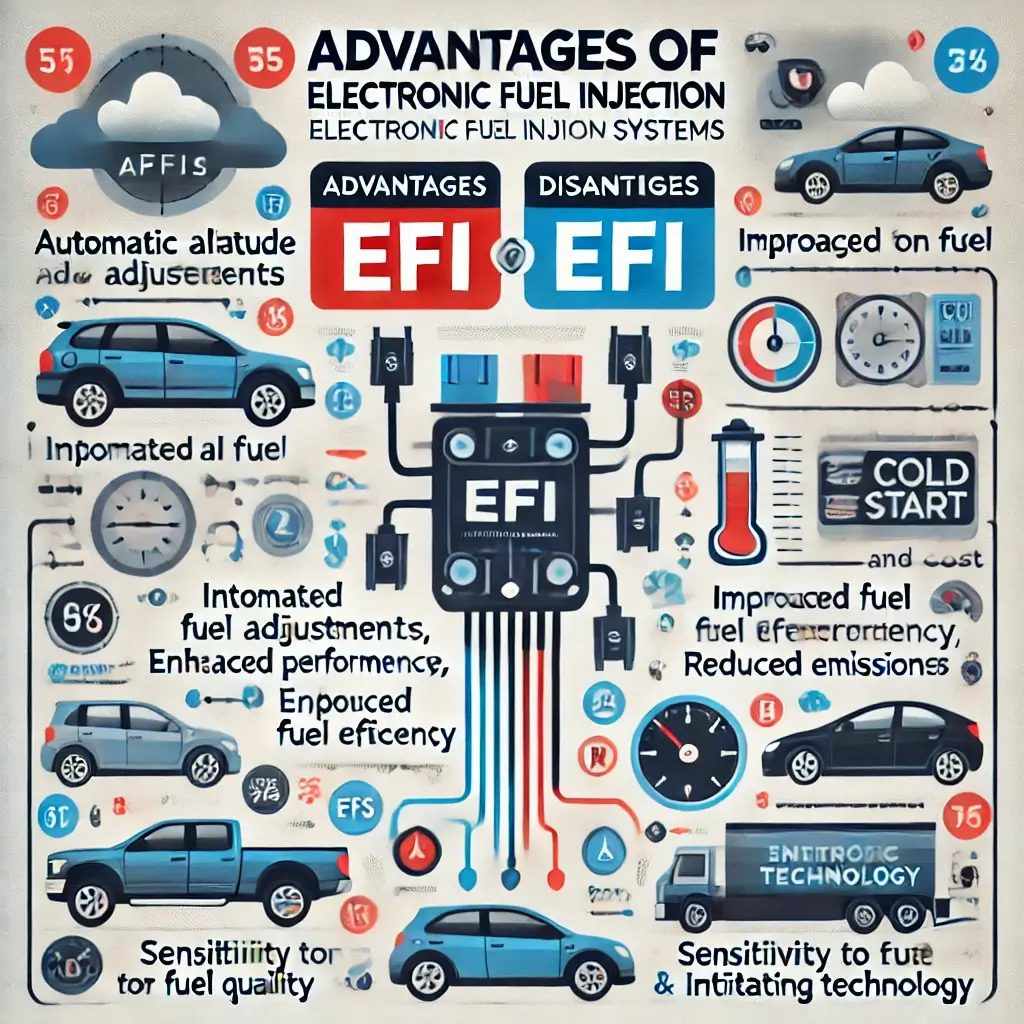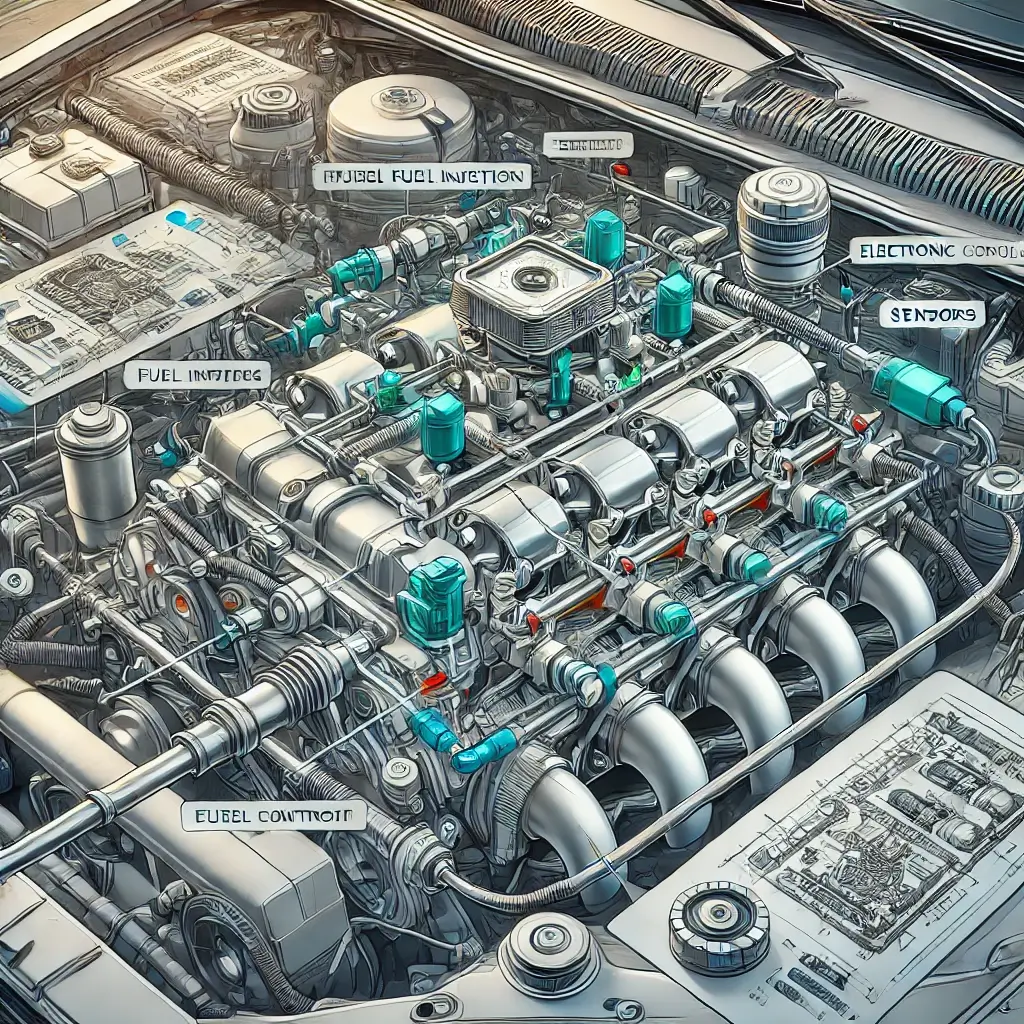Electronic Fuel Injection (EFI) systems have revolutionized automotive technology, offering numerous benefits over traditional carburetor-based systems. By precisely controlling the air-fuel mixture delivered to the engine, EFI enhances fuel efficiency, reduces emissions, and improves overall performance. However, these advantages come with considerations such as increased complexity and cost.

This article explores the key advantages and disadvantages of EFI systems, providing insights for both current users and those new to the technology.
Advantages of EFI System
Automatic Altitude Adjustments
One of the most notable advantages of EFI systems is their ability to automatically adjust for changes in altitude. As a vehicle ascends to higher elevations, the air density decreases, which can affect engine performance. EFI systems can detect these changes through built-in sensors and adjust the air-fuel mixture accordingly, ensuring optimal combustion and maintaining engine efficiency. This automatic adaptation improves drivability in various terrains, making EFI systems highly versatile.
More Consistent Power
EFI systems provide more consistent power delivery compared to older carbureted systems. The precise control over fuel injection allows for better engine performance, as the system can deliver the exact amount of fuel required for optimal combustion under varying conditions. This consistency results in smoother acceleration, improved throttle response, and a more enjoyable driving experience overall
Improved Fuel Efficiency
Electronic Fuel Injection (EFI) systems are engineered to deliver precise amounts of fuel to the engine, optimizing the air-fuel mixture for combustion. This precision leads to enhanced fuel efficiency, allowing vehicles to achieve better mileage per gallon compared to traditional carburetor systems. The EFI system’s ability to adjust fuel delivery in real-time ensures that the engine operates at peak efficiency under various driving conditions.
Enhanced Engine Performance
By accurately controlling fuel distribution, EFI systems provide smoother acceleration and increased power output. The precise fuel metering ensures that each cylinder receives the optimal fuel mixture, resulting in improved throttle response and overall engine performance. This enhancement is particularly noticeable during rapid acceleration and when navigating challenging terrains.
Reduced Emissions
EFI systems contribute to lower emissions by ensuring complete combustion of the fuel-air mixture. This thorough combustion minimizes the release of harmful pollutants, helping vehicles meet stringent environmental regulations. The system’s efficiency in fuel management plays a crucial role in reducing the carbon footprint of automobiles.
Cold Start Reliability
One of the notable advantages of EFI systems is their ability to facilitate easier cold starts. By providing the engine with the correct fuel mixture during startup, EFI reduces the need for manual choke adjustments, which are often required in carbureted systems. This feature is especially beneficial in colder climates, where starting a vehicle can be challenging.
Advanced Diagnostics and Control
Modern EFI systems are equipped with onboard diagnostics that monitor various engine parameters in real-time. This capability allows for quick identification of issues and aids in efficient troubleshooting. The advanced diagnostic features enable mechanics and technicians to pinpoint problems accurately, reducing repair times and costs.
Disadvantages of EFI System

Complexity and Cost
Despite their benefits, EFI systems come with increased complexity and cost. The integration of electronic sensors, injectors, and engine management computers makes these systems more intricate than traditional carburetors. As a result, manufacturing and maintenance costs can be higher, and specialized knowledge is often required for repairs.
Dependency on Electronics
EFI systems rely heavily on electronic components, making them susceptible to issues such as sensor failures or wiring problems. A malfunction in any electronic part can disrupt the entire fuel injection process, potentially leading to engine performance issues or breakdowns. This dependency necessitates regular maintenance and prompt attention to electronic faults.
Sensitivity to Fuel Quality
EFI systems are designed to operate with fuel of a specific quality. The use of contaminated or substandard fuel can lead to injector clogging and other performance issues. Therefore, it’s essential for users to ensure that their vehicles are refueled with clean, high-quality fuel to maintain optimal performance and extend the life of the EFI components.
Intimidating Technology
For individuals accustomed to traditional carburetor systems, the transition to EFI can be daunting. The electronic nature of EFI systems introduces complexities that may require a learning curve for proper understanding and maintenance. This factor can be a barrier for enthusiasts who prefer hands-on tuning and straightforward mechanical adjustments.
Higher Initial Investment
Converting a vehicle from a carburetor to an EFI system involves a significant initial investment. EFI kits and components are often priced higher than traditional carburetors, and the installation process can be more complex and time-consuming. Prospective adopters should weigh the long-term benefits against the upfront costs to determine if EFI is the right choice for their application.
Higher Emissions
One significant drawback of EFI systems is that they can produce higher emissions compared to other fuel delivery systems, especially older carburetor systems. The electronic control of fuel injection may not always optimize combustion under all conditions, leading to incomplete fuel burning. As a result, EFI vehicles may emit more nitrogen oxides (NOx) and hydrocarbons, which are harmful to the environment and contribute to air pollution. This can be particularly problematic in regions with strict emissions regulations.
Reduced Power Output
In certain scenarios, EFI systems may also lead to reduced power output. This can occur if the system does not adjust fuel delivery accurately for varying engine demands or if there are issues with sensor readings. For example, if the air-fuel mixture is too rich or too lean, engine performance may suffer, resulting in sluggish acceleration and reduced overall power. This can be particularly frustrating for drivers seeking a responsive and powerful driving experience.
Final Thoughts
The transition from traditional carburetor systems to Electronic Fuel Injection (EFI) represents a significant advancement in automotive technology. While EFI systems offer numerous advantages, such as improved fuel efficiency, enhanced performance, and automatic altitude adjustments, they are not without their drawbacks. Issues like higher emissions and reduced power output can pose challenges, particularly for drivers accustomed to more straightforward fuel delivery systems.
Ultimately, the choice to utilize an EFI system should be based on individual needs and driving conditions. For those who prioritize fuel economy and consistent engine performance, EFI is often the superior option. However, it is essential to be aware of potential complications and maintenance requirements associated with the technology.
FAQs About EFI Engines
While EFI systems offer many benefits, they can encounter issues such as sensor failures, electrical problems, or fuel delivery issues. Because EFI is a more complex system than traditional carburetors, diagnosing and repairing these issues can be challenging and expensive.
Cost: EFI systems are generally more expensive to install and repair than carbureted systems.
Complexity: The electronic components can fail and may require specialized knowledge for troubleshooting and repairs.
Cold Starts: In some cases, EFI systems may struggle with cold starts compared to carbureted systems, although modern EFI has improved in this area.
Compatibility Issues: Some EFI systems may not be compatible with all types of engines or fuel types, which can limit options for modifications.
EFI systems can face various problems, including malfunctioning sensors, which can lead to incorrect air-fuel mixtures, resulting in poor engine performance, increased emissions, or stalling. Additionally, electronic components may be more susceptible to moisture or corrosion.
Yes, EFI engines are generally considered good due to their advantages, such as improved fuel efficiency, lower emissions, and easier starting in various conditions. They provide more precise fuel delivery than carbureted engines, leading to better overall performance and reduced maintenance needs. However, the benefits come at a higher initial cost and potential complexities during repairs.
